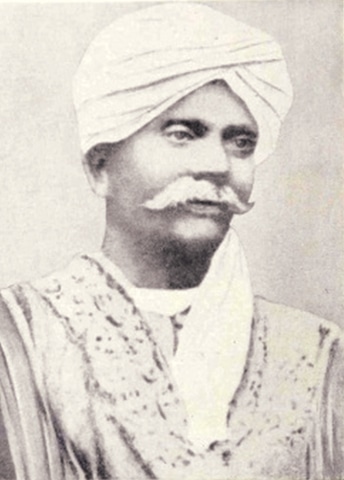
IT is a pity that many books written on the history of Urdu language and literature do not mention, for one reason or the other, some authors who had contributed to the promotion of both Urdu language and literature. Master Ramchandr is one such author and Urdu’s literary history has not only ignored him but has almost forgotten him.
Very little has been written on Master Ramchandr, though he had played a critical role in development of Urdu essay-writing and modern Urdu prose. In fact, Ramchandr was Urdu’s first essay writer, but lack of knowledge about Ramchandr and his Urdu essays has led to the misconception that Sir Syed Ahmed Khan was Urdu’s first essay writer. As proven by Syeda Jafer in her book Master Ramchandr aur Urdu nasr ke irtiqa mein un ka hissa, Ramchandr began writing essays in Urdu much earlier than Sir Syed.
Ramchandr taught mathematics and science at Delhi College and was popular among the students as well as the administration. Since a teacher who taught at school was called ‘master’ in the subcontinent in those days, the word became a part of Ramchandr’s name. According to Moulvi Abdul Haq, Ramchandr was born in Panipat in 1822. Siddiq-ur-Rahman Qidvai in his book Master Ramchandr wrote that Ramchandr belonged to a Hindu Kayasth family and his father Rai Sunderlal Mathur was a native of Delhi but was posted at Panipat as ‘naib tehseeldar’.
In 1831, when Ramchandr was hardly 10, his father died. But Ramchandr’s mother was determined to adorn her children with education. So in 1833, Ramchandr was admitted to an English-medium school where students would get a monthly scholarship of Rs2. As was the tradition, Ramchandr got married at a very early age and he had to do a job, quitting his education, to support the family. Determined to continue his education, he left the job and was admitted to Delhi College in 1841. He appeared in a competitive exam to win the scholarship of Rs30 a month. This relieved him of the financial worries and he devoted his time to study.
In February 1844, Ramchandr was appointed as a teacher at Delhi College. Felix Boutros was Delhi College’s principal at that time and, being a scholar and orientalist, he stressed teaching oriental languages and translating scientific and modern western knowledge into Urdu. In fact, Boutros and his successor Aloys Sprenger played a vital role in spreading scientific and modern knowledge in the Northern India through Delhi College and translations into Urdu. At Delhi College, Ramchandr translated books into Urdu on subjects like trigonometry and algebra for Vernacular Translation Society.
Master Ramchandr launched in 1845 an Urdu magazine named Favaaid-un-naazireen and wrote essays for it. In 1847, he launched another Urdu magazine Khair khwah-i-Hind, which was renamed as Muhib-be-Hind. These magazines stressed on rationality and modern ideas, which raised many heckles and Ramchandr was sometimes accused of ‘blasphemy’. These magazines, according to Abdul Haq, had to be closed down in 1852 for lack of support.
Ramchandr’s rational approached led him to denying the worship of idols and he was convinced of monotheism, but later Christianity appealed him more and he converted to Christianity in July 1852. According to Ramchandr himself, converting to Christian faith was one of the most important events of his life and it was fiercely opposed by his near and dear ones. The decision caused an outrage, especially among Hindus. But some of his students, such as, Moulvi Zakaullah and Moulvi Nazeer Ahmed kept on meeting him and following him. Rumour had it that both were impressed and influenced with Christianity. In Hayat-un-Nazeer, a biography of Moulvi Nazeer Ahmed, author Iftikhar Alam has written that Nazeer was so much influenced by Ramchandr that he had almost converted to Christianity, though later returned to Islam.
During the 1857 freedom war, some Hindu and Muslim soldiers fighting against the British were after Christians and had killed Ramchandr’s friend Chaman Lal who had renounced his Hindu faith for Christianity. But Ramchandr somehow escaped to the safety of British camp. Sir William Muir asked him to translate into English the Persian manuscripts. In December 1857, Ramchandr resigned from Delhi College and was appointed in January 1858 the Native Head Master of Thomason Civil Engineering College, Roorkee. But he returned to Delhi after a few months and was made the principal of a school in Delhi. In 1866, he took retirement and went to Patiala as Raja’s mentor. In 1868, he was made the director of education of the Patiala’ education department.
Ramchandr was against writing the flowery and ornamental prose that Urdu had inherited from Persian. He stressed that the language of the prose should be simple enough to convey the thought and making it ornamental does not help. Ramchandr and some other teachers of Delhi College must be appreciated for introducing western and scientific knowledge to the readers of Urdu by translating books from English into Urdu.
Some of the books by Ramchandr are: Ilm-i-musallas (1844), Usool-i-jabr-o-muqabila (1845), Ajaaibaat-i-rozgaar, (1847), Tazkirat-ul-kaamileen (1849), Kulliyaat-o-juziyaat (A treatise on maxima and minima) (1850), Saree-ul-faham (1849), Bhoot nahang (1855), Usool government ke and Tafarruqi ahsa (Differential calculus) (1863). Some of his essays were collected by Syeda Jafer.
Master Ramchandr died on August 11, 1880.
Published in Dawn, August 7th, 2017













































Dear visitor, the comments section is undergoing an overhaul and will return soon.